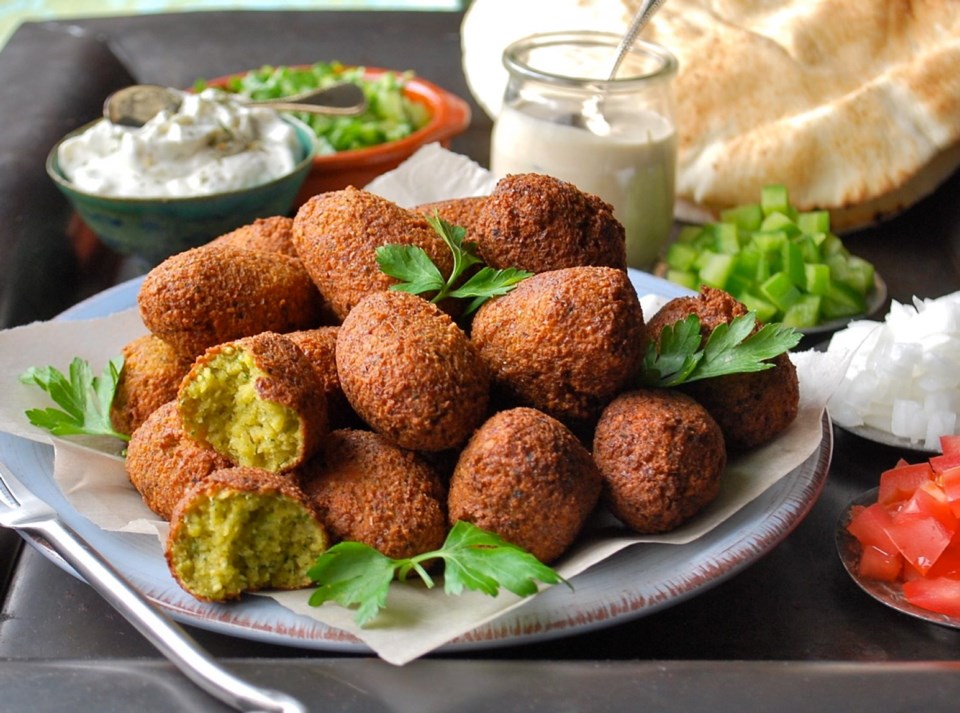Falafel seems to be a food most people enjoy in a restaurant or from a food truck or stand. Or, if people do make it themselves, many will go the convenience route and use a boxed, just-add-water falafel mix sold at most supermarkets.
That’s understandable, because making falafel from scratch takes a bit of time and, if you have a craving for it, you might not be able to wait that long.
But if you can quell that craving for a while, it’s worth the extra effort to make your own falafel. You can flavour it as desired, be in complete control of the ingredients used and enjoy the satisfaction of creating your own version of a dish that has been served for centuries.
In Ghillie Basan’s beautiful book Flavors of the Middle East, she writes that falafel has long been popular wherever you go in that region. It’s regarded as a national dish in several countries and communities, including Egypt, Jordan, Israel and the Palestinian Territories.
Now enjoyed around the world, falafel is made by soaking dried pulses, such as chickpeas and/or fava beans, in water for many hours until they’re plumped up and reconstituted.
The uncooked pulses are then blended with flavourings and a leavener, such as baking soda or baking powder, which causes the falafel to puff a bit and lighten when cooked.
After reviewing numerous recipes, I learned that the quantity and type of flavourings added to falafel can vary.
But those I commonly saw included onion, garlic, fresh herbs such as parsley, mint and/or cilantro, and spices, such as cumin, coriander and cayenne or other spicy pepper powder.
In some recipes, when the ingredients were combined, the falafel mixture was shaped by hand into balls; in others, it was formed into disc shapes. In either case, after the falafel balls or discs were fried, they were either stuffed or wrapped in pita bread, or simply served with it.
My recipe combines a few techniques I found for making falafel and offers a range of items you can serve to complement its flavour, including Middle Eastern-style sauces and raw vegetables. Serve whatever appeals to you most.
Eric’s Falafel
This is my tasty version of falafel, with a base of dried, soaked and drained chickpeas. You’ll find dried chickpeas for sale in the bulk-foods section of grocery stores and at stores specializing in bulk foods.
Preparation time: 40 minutes, plus dried-chickpea soaking time
Cooking time: about three minutes per batch of falafel
Makes: about 20 falafel, or four (five falafel each) servings
1 cup dried chickpeas (about 200 grams)
4 cups cold water
1 small onion, diced (about 2/3 cup; see Note)
2 large garlic cloves, sliced
1/3 cup very coarsely chopped cilantro
1/3 cup very coarsely chopped parsley
1 tsp salt
1 tsp ground cumin
1/2 tsp ground coriander
1/8 tsp ground cayenne pepper
3 Tbsp all-purpose flour
1 tsp baking powder
• vegetable oil for frying
• warm pita bread, to taste
• items to serve with falafel, such as tahini sauce or hummus, tzatziki or thick yogurt, mild or spicy harissa, chopped tomatoes, onion and green bell pepper, shredded lettuce, crumbled feta and/or pitted black olives
Place chickpeas in a bowl and cover with 4 cups cold water. Let chickpeas soak at least eight hours or overnight.
Drain chickpeas well, then set in a food processor. Add the onion, garlic, cilantro, parsley, salt, cumin, coriander, cayenne, flour and baking powder. Pulse ingredients until well combined and chickpeas are finely chopped.
Use a spatula to transfer the falafel mixture to a bowl. Now cover and refrigerate at least one hour to allow flavours to meld.
When ready to cook, line a baking sheet with parchment paper. With your hands, form 2 Tbsp amounts of the chickpea mixture into oblong balls, each about 1 1/2-inches long.
Set the balls, not touching, on the baking sheet as you go along making them. You should get 20 balls.
Preheat oven to 200 F. Pour 1 1/2 to 2 inches of vegetable oil into a deep skillet. Set over medium-high heat and warm oil to 350 F to 375 F. Adjust the heat as needed to maintain that temperature. Fry the falafel, five or six at a time, for about 75 to 90 seconds per side, until deep golden and cooked through. Drain the cooked falafel on paper towel and keep warm on a clean baking sheet in oven until all are fried.
Serve the falafel stuffed or wrapped in warm pita, or simply serve with wedges of warm pita. Top or accompany the falafel with some or all of the other items listed. As noted, they could include tahini sauce (or hummus), tzatziki (or thick yogurt), chopped tomatoes, onion and green bell pepper, shredded lettuce, crumbled feta, harissa or pitted black olives.
Note: If your onion is particularly strong smelling and tasting, soak the diced onion in a generous amount of cold water for 10 minutes. Drain well and use it as directed in the recipe.
Eric’s options: If 20 falafel is too many, you could freeze the ones you have left over after frying.
To reheat, thaw them and zap in the microwave until hot, or warm on a baking sheet in a 350 F oven 10 to 15 minutes.
Eric Akis is the author of eight cookbooks. His columns appear in the Life section Wednesday and Sunday.



